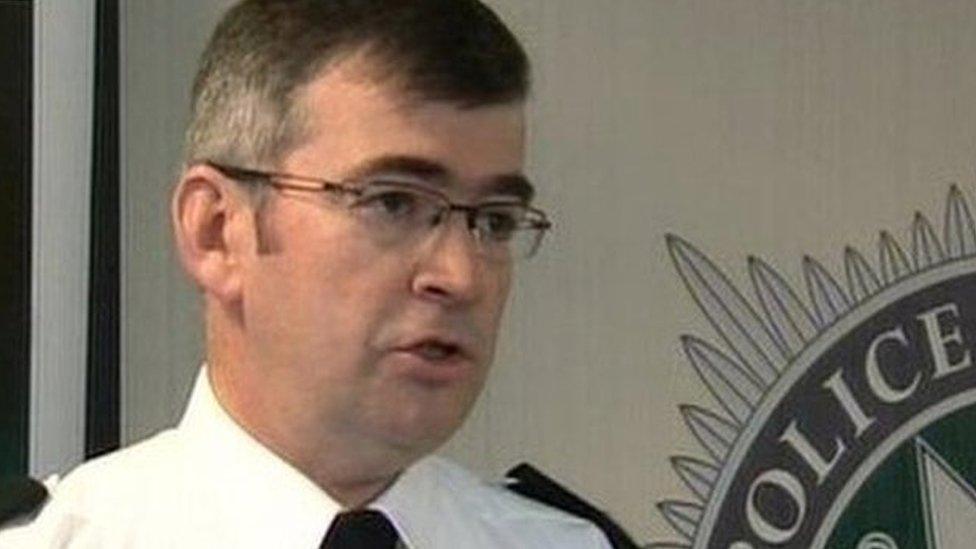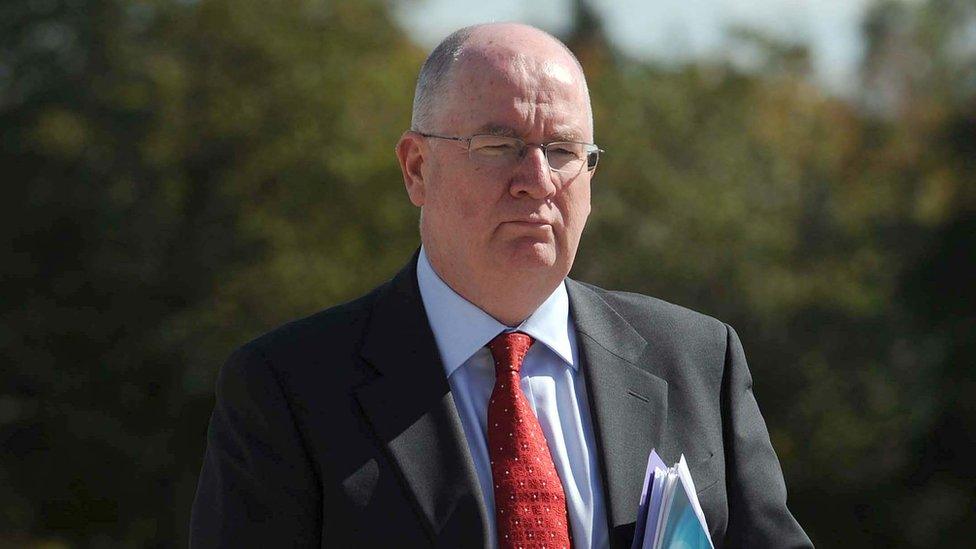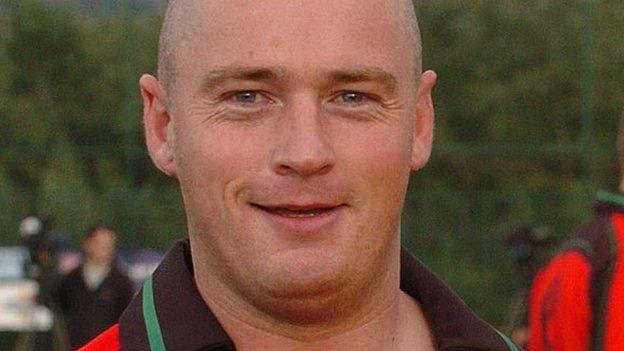PSNI officers disciplined over Peadar Heffron bomb attack failings
- Published
Peadar Heffron, who was captain of the PSNI's Gaelic football team, has since left the police
Four police officers who failed to give information to detectives investigating the attempted murder of a colleague in Northern Ireland are to be disciplined.
Peadar Heffron was seriously injured, external by a dissident republican bomb in 2010.
A Police Ombudsman report has said repeated requests for intelligence did not get any meaningful response.
But it said there is insufficient evidence that police failed to act on a piece of information that could have prevented the attack.
Target
As captain of the PSNI's Gaelic football team and an Irish language speaker, Constable Peadar Heffron was a high-value target for dissident republicans trying to deter Catholics from joining the Police Service of Northern Ireland (PSNI).
His leg was amputated and he suffered other serious injuries after a bomb exploded under his car in Randalstown, County Antrim. He has since left the police.

Forensics officers remove Peadar Heffron's car
Detectives trying to catch those responsible contacted the PSNI's intelligence gathering department, C3, several times to request assistance, but they did not get it.
In one instance, detectives had to wait more than two years for information they requested.
The report, published on Friday, said that information was only made available after C3 was informed that Police Ombudsman Michael Maguire was looking at the issue.
Dr Maguire said: "I have concluded that C3 did not supply detectives with the information they sought.
"I am of the view that this was contrary to PSNI procedures."

Analysis
This report is hugely embarrassing for the PSNI.
Police officers stand accused of failing to do enough to help colleagues who were trying to catch those responsible for trying to kill one of their own.
The failure to provide the material is a clear breach of PSNI protocols governing the dissemination of intelligence information
Those protocols were introduced after a series of critical reports that said Royal Ulster Constabulary (RUC) Special Branch frequently withheld material from detectives investigating serious crimes, including murder.
The failure to share intelligence led to Special Branch being described as "a force within a force".
The protocols were supposed to ensure those days were in the past and that detectives trying to solve serious crimes would be given access to the intelligence material they needed, and when they needed it.
However, those protocols failed.

Speaking on Friday, PSNI Deputy Chief Constable Drew Harris, said as a result of the ombudsman's findings, the police owed Mr Heffron an apology over failings in their investigation into the attack on him.
In a statement in response to the report, Mr Harris said he welcomed "the ombudsman's conclusion that a complaint which alleged police had been provided with information which, if acted upon, could have prevented the attack on Constable Heffron, is not substantiated".
"In relation to an additional conclusion that officers in Intelligence Branch did not supply investigating detectives from Serious Crime Branch with the information they sought, the Police Service view is that this line of enquiry was pursued and belatedly closed down but that it was not directly related to the attempted murder of Constable Heffron," he added.
"However, the Police Service is receptive to any learning which can be gleaned from such reports.
"There was an administrative failing in this case in which the line of enquiry was not processed as quickly as it should have been. This issue has been addressed and resolved by a number of measures including the establishment of secure means of passing material from Intelligence Branch to Serious Crime Branch.

Deputy Chief Constable Drew Harris said he agreed there was a "requirement for disciplinary sanctions in this case"
"It is our view that all credible lines of enquiry in this investigation, which is still open, have been pursued. I would continue to appeal for anyone with information about the bomb attack in Randalstown on 8 January 2010 to come forward."
He said he agreed there was a "requirement for disciplinary sanctions in this case".
"Having reviewed the full circumstances of this investigation, I decided on an appropriate sanction for each of the detective superintendents," he said. "Disciplinary sanctions in respect of the detective sergeants are currently being considered."
The ombudsman acknowledged that the intelligence material detectives waited more than two years to receive did not ultimately lead detectives to significant evidence, but he said "investigative momentum was lost".
"In major crime investigations it is a matter of PSNI policy that investigators are provided with intelligence at the earliest opportunity," Dr Maguire added.
'Clear protocols'
"Investigators are those who are best placed to make judgements about lines of inquiry, so when they ask for a piece of information, at the time that they ask for it, no-one knows how important it's going to be, no-one knows the extent to which it will enable or facilitate an investigation.
"So whenever an investigation requests information, there are clear protocols in place for how that information should be transferred. That wasn't done in this case."

Police made a fresh appeal for information a week after the attack
Details of the intelligence failings were uncovered during an investigation of a complaint from a man, who said he warned police about a planned bomb attack on an officer weeks before the attack on Peadar Heffron.
He claimed the police failed to act on information he alleged could have prevented the attack.
The ombudsman said there was insufficient evidence to support that claim, because the warning did not specify where an attack might take place.
Dr Maguire has recommended disciplinary action against four members of the PSNI intelligence unit, "for misconduct in their failures to take measures to bring offenders to justice".
Those facing action are two detective superintendents and two detective sergeants.
The ombudsman recommended that the four officers should receive written warnings, but the report reveals that the PSNI disagreed and imposed a lower level of sanction on the two detective superintendents.

Police Ombudsman Dr Michael Maguire recommended sanctions against the four officers
Dr Maguire is clearly unhappy with the PSNI decision.
"We were concerned enough to recommend the discipline of four officers, because the failure to provide information from intelligence to investigators for me is a hugely important issue," he said.
'Disturbing'
"I'm very clear that it's the role of this office to make recommendations in relation to sanctions.
"We go through a robust process in thinking about what the sanctions should be in the case where we believe an officer falls below the standards, so when we make a recommendation we are pretty clear and confident that it's the right recommendation.
"I do still believe the recommendation put forward is the right one, but it's for the police to account for why they made that change."
The chair of the Policing Board, which holds the PSNI to account, said the report's findings "make for disturbing reading".
Anne Connolly said it raised serious questions, and the board would be seeking assurance from Chief Constable George Hamilton that "actions have been taken to address all the shortcomings identified".
Chief Constable George Hamilton and Deputy Chief Constable Drew Harris are due to meet Policing Board members on Tuesday.
- Published4 June 2014
